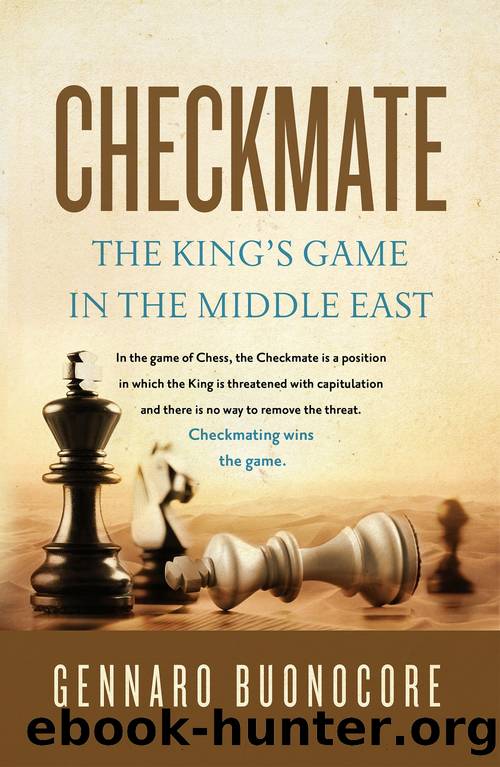Checkmate: The King's Game in the Middle East by Gennaro Buonocore

Author:Gennaro Buonocore [Buonocore, Gennaro]
Language: eng
Format: epub
ISBN: 9781735853505
Google: 3prkzQEACAAJ
Publisher: Notable Kids Publishing
Published: 2020-11-24T23:33:23.799969+00:00
The Queen and the Rooks
America, Iran, and Egypt
People talk about centuries-old victories as if they had happened yesterday, and they all dream that their forefathers fought there.
SINCE THE 1950S, America, the strongest economic and military power that the world has ever seen, has become the Christian Westâs face in the Middle East and Islamic countries, all around the world. It is, at the same time, admired, loathed, and feared by Muslims.
A month after the 9/11 attacks, Usama bin Laden, the leader of Al Qaeda, was interviewed by Tayseer Alouni for Al Jazeera television. When asked by Alouni, âAl Qaeda is facing now a country that leads the world militarily, politically, technologically. Surely, the Al Qaeda organization does not have the economic means that the United States has. How can Al Qaeda defeat America militarily?â Bin Laden replied: âThis battle is not between Al Qaeda and the U.S. This is a battle of Muslims against the global crusadersâ¦â
Bruce Riedel, a former CIA officer deeply involved in the Middle East and author of the book Beirut 1958âHow Americaâs Wars in the Middle East Began, indicates the deployment of 14,000 U.S. military personnel during Operation Blue Bat in Lebanon (15 July 1958 to 25 October 1958) as the first act of American activism in the Middle East.
In the book, Riedel, who emphasizes that his book is not a history book but an essay on foreign policy, stresses how, in the aftermath of World War II and the Korean War, Dwight D. Eisenhower, even if he had never been in combat, fully grasped the dire price of war. Despite understanding the risky reality of further bloodshed, Eisenhower did not hesitate to resort to the use of his Department of Defenseâs capacity abroad in order to alleviate hard domestic-policy realities, as he was behind in the presidential election polls.
At that time, the Soviets were being perceived as ahead in the space race, and momentous and courageous decisions had to be taken to sway the public opinionâs approval. This moment might have been the first but will not be the last time that American military operations in the Middle East have been undertaken in order to address a domestic-policy climate rather than for foreign-affairs reasons.
Riedel, who both grew up in the Middle East and extensively worked across the region, believes that the USA has tended to overreact in the area, before waiting for the dust to settle. This leads to ineffective solutions.
Richard Engel, Chief Foreign Correspondent for NBC News and author of the book And Then All Hell Broke LooseâTwo Decades in the Middle East, states that the Middle East flares suddenly. Signs of events to come can be seen in advance, but once strife starts, it is generally uncontrollable. He believes that this is the result of a cultural and emotional attitude which is common to both those âMiddle Eastern nations with long histories and no oil and those that have lots of oil and no history.â
I do not fully concur with Riedelâs analysis on the American tendency to overreact.
Download
This site does not store any files on its server. We only index and link to content provided by other sites. Please contact the content providers to delete copyright contents if any and email us, we'll remove relevant links or contents immediately.
| Africa | Americas |
| Arctic & Antarctica | Asia |
| Australia & Oceania | Europe |
| Middle East | Russia |
| United States | World |
| Ancient Civilizations | Military |
| Historical Study & Educational Resources |
Machine Learning at Scale with H2O by Gregory Keys | David Whiting(4292)
Never by Ken Follett(3937)
Fairy Tale by Stephen King(3370)
Oathbringer (The Stormlight Archive, Book 3) by Brandon Sanderson(3156)
The Man Who Died Twice by Richard Osman(3072)
Will by Will Smith(2908)
Rationality by Steven Pinker(2352)
Can't Hurt Me: Master Your Mind and Defy the Odds - Clean Edition by David Goggins(2323)
The Dark Hours by Michael Connelly(2300)
Friends, Lovers, and the Big Terrible Thing by Matthew Perry(2219)
The Dawn of Everything: A New History of Humanity by David Graeber & David Wengrow(2196)
Principles for Dealing With the Changing World Order: Why Nations Succeed and Fail by Ray Dalio(2039)
A Short History of War by Jeremy Black(1842)
HBR's 10 Must Reads 2022 by Harvard Business Review(1839)
Go Tell the Bees That I Am Gone by Diana Gabaldon(1753)
A Game of Thrones (The Illustrated Edition) by George R. R. Martin(1721)
Kingdom of Ash by Maas Sarah J(1668)
515945210 by Unknown(1660)
443319537 by Unknown(1545)
